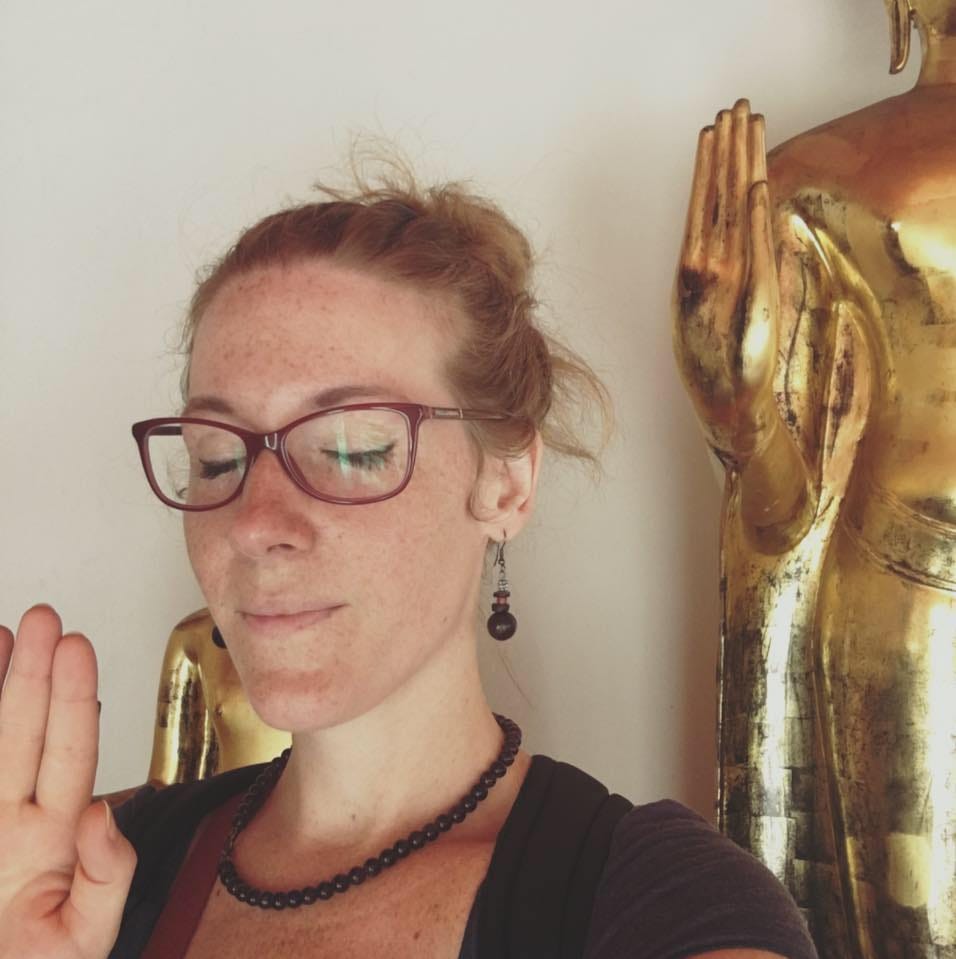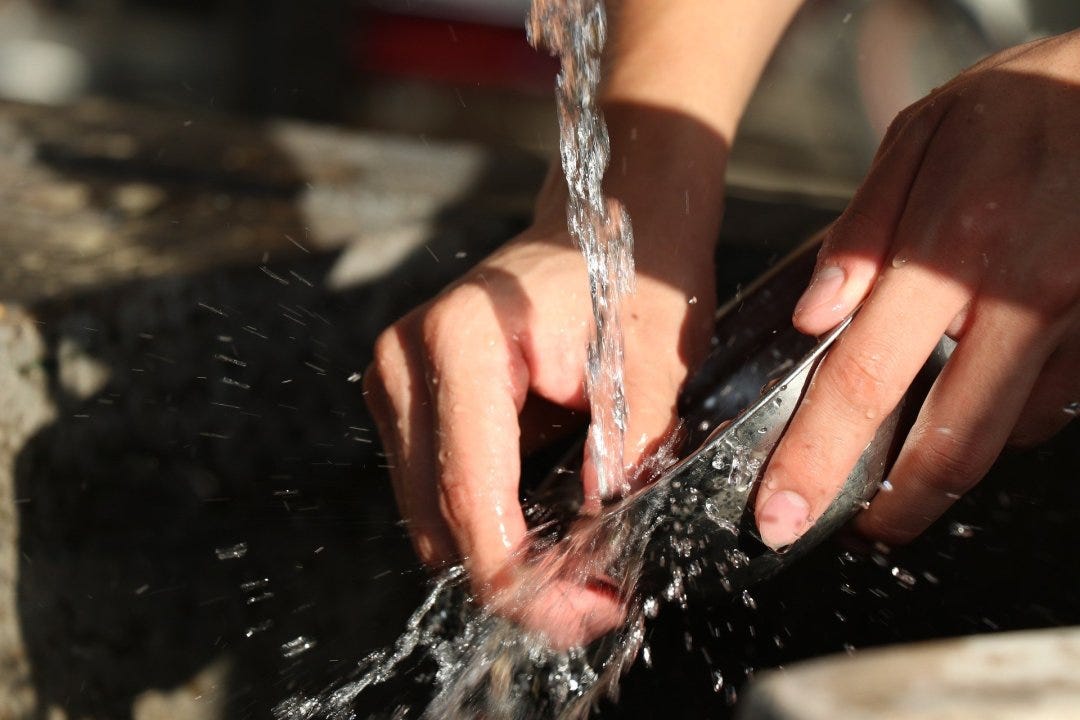When your French Practice Becomes a Meditation
Learning French with the Wisdom of Thich Nhat Hahn
As an intermediate learner, you may have noticed that learning French has its challenges, especially when we focus on the results. You may know that mindfulness and meditation offers us many tools for a more peaceful, sustainable and pleasant approach to language learning, but what if language learning became a meditation per se? Let’s find out how.
If you believe meditation means sitting in a weird position and not think at all while chanting “ooommm”, chances are you haven’t meditated much. Or at least not successfully. Maybe you’ve tried a couple of times, noticed that your thoughts were all over the place, which made you feel more anxiety than the promised holy grail of inner peace. And you ended up concluding that this wasn’t for you. Sounds familiar?
Don’t worry, that’s exactly how I felt. Before I actually learned to meditate.
Because meditating is something we learn to do so that it works for us. Just like we need learn to how learn a language in a way that is adapted to our minds and personalities.
What’s the truth about meditation?
Thoughts are made to wander. That’s in their nature. And as a consequence, you can’t really control whether a thought pops into your head or not. For example, if I told you to try not to think of a white rabbit, chances are you’d be picturing that cute rabbit in your mind right away. With a pink ribbon. And a oversized pocket-watch.
So trying to block thoughts from occurring is naturally going to make you feel frustrated. But meditation isn’t about becoming a zen master in a Japanese pagoda. It isn’t a prayer and it isn’t about practising a religion or a dogma either.
Meditating is simply practising being present with ourselves, whether your are sitting, lying down, walking or standing.
When we meditate, we bring awareness to ourselves and our environment through our physical senses. We quiet the mind by reconnecting to our body, generally through the breath.
Thoughts will arise, of course, and that’s when it becomes interesting.
Instead of blocking the thought (and judging ourselves for thinking again), we gently let the thought pass through us. We notice it, acknowledging its presence, and then we let it go and go back to what we were focusing on.
That’s what a formal meditation looks like.
Along other benefits, meditation is really helpful to create space in our mind. An ability to pause before we react. An possibility to select the thoughts that are relevant to us and to choose how we respond to them. A chance not to be in our heads too much, and to reconnect with our wise body, heart and intuition. Our authentic self.
Meditation is the practice of being present with our senses to what we do.
Practising presence when Studying French
Practising presence while doing any learning activity enhances the experience we have of that activity. When we choose to be open and curious to the information we can receive through our senses, they are hightened: the shapes, the colours, the noises, the smells, the touch, the taste. It’s like getting an HD camera for the first time. Better quality, better enjoyment.
When you wash the dishes, just wash the dishes
In his book The Miracle of Mindfulness, Thich Nhat Hahn, a famous Vietnamese buddhist monk, prompts us to seek mindfulness in every action we undertake. As we puts it “when you wash the dishes, just wash the dishes”. To practise mindfulness, we must be careful to do just one thing at a time and not to let our mind wander.
We live in a modern world where result and productivity are king and queen, and also where the number of people suffering from anxiety, depression and other mental issues is alarming. Our society prompts us so much to keep doing more and more stuff that we have forgotten how to simply be.
When we are present in what we do, we combine our actions with presence. And it’s really beneficial on all levels: we get to experience and enhance the pleasure of doing things, and at the same time we do get better results as we put more attention to what we are doing.
When we are present in what we study, we can bring awareness and presence to our actions. Whether we’re reading a text in French, journaling, listening to a podcast or memorising expressions, we can be immersed in our task and experience the pleasure of those activities. Instead of focusing on what the results, we are living the joy of learning French as a process.
When you wash the dishes, wash them just to wash them.
Not to have them clean.
I can hear you from here. “Jessica, that’s all very nice, but is it going to work? Am I going to be fluent soon? Is it really efficient?”
I get it. We are obsessed with time-bound results and efficiency. It’s not entirely our fault, we are conditioned by our patriarchal and consumerist world. Which means we really must make a conscious effort to let go of our need for immediate gratification.
Again, our friend Thich Nhat Hanh says: “ When you do the dishes, you don’t do so to get them clean, but just for the sake of doing them. You do them with mindfulness and love for the process.” He goes on: “If while washing dishes we think only of the cup of tea that awaits us /…/ we are not alive during the time we are washing the dishes. /…/ Chances are we won’t be able to drink our tea either.”
And we must agree that at the end of this task, the dishes will probably be clean. And maybe even cleaner that if we had rushed through the process, right?
Likewise, consider studying French just for the sake of studying French, connecting with the love of actually studying it, the love of learning new things and opening your mind and your heart to another way of expressing yourself and connecting to the world.
Trusting the process is really key here.
You must trust that if you are regularly practising French, venturing a little bit outside of your comfort zone, with a method that is right for you, your progress is inevitable.
Just like it’s inevitable that the dishes will be clean.
The ritual of Studying French
Studying French becomes then almost like a ritual. A sacred moment that you create for yourself.
The moment you decide to journal in French, do only that. Just like for a meditation, set the mood:
Put your phone on “silent mode”. Turn off your notifications.
Put your favourite music for concentration.
Sit down, aware of your position.
Make sure that your back is supported, that your shoulders are open and relaxed. This will help you feel safe, positive and confident.
Open your notebook, aware of your movement, as well as the sensations and emotions that this brings you.
Pick up your pen and take a few deep breaths. You can close your eyes if that feels nice to you.
Connect to your body and heart: what is it that you need to express today?
As you start writing, be aware of the sound that the pencil makes when it dances on the paper.
Stay aware of your body. It will tell you when stress appears, whether because of what you are writing or because of some fear not to have the right words and structure to express your thoughts.
Breathe into the tensions and relax.
When your thoughts wander, remember that this is normal. Simply acknowledge that they have wandered and with compassion, bring your mind back to the here and now. You can use the physical sensations of the breath as an anchor, a bridge between your mind and body.
With mindfulness, any activity becomes a meditation. Being completely present in your current language practice allows you to be connected to yourself and to the pleasure of learning.
Which is what life is about, ultimately.








Thanks for this! Sadly, I find for many of my students 'language learning' is something completely detached from their body. So much good work to do with bringing mindfulness to true study practices. A.